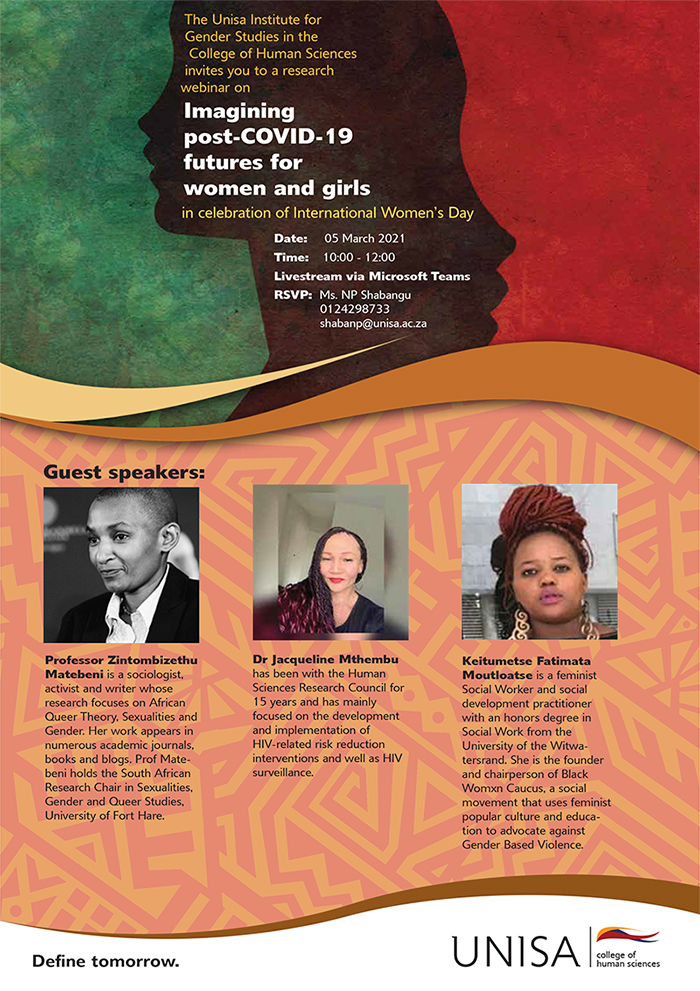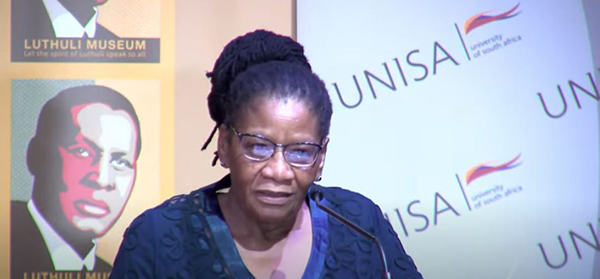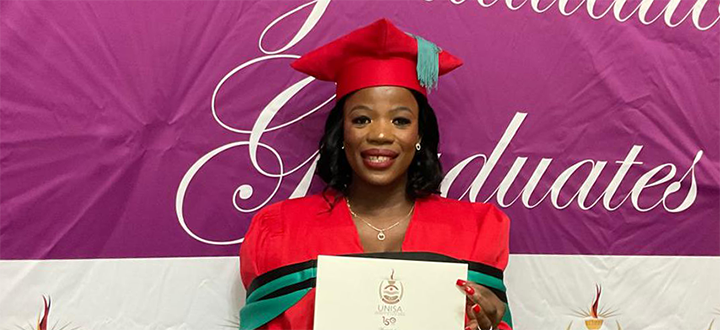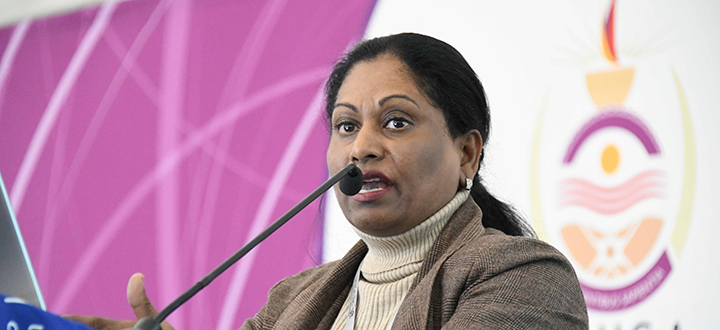Chief Albert Luthuli Research Chair
Reflecting on Chief Albert Luthuli's varied legacies
Unisa, in partnership with the Luthuli Museum Council, hosted the Chief Albert Luthuli Research Chair Founders Lecture entitled Let my people go: Reflecting critically on Chief Albert Luthuli's varied legacies. The theme was centred around Luthuli’s spirituality, his connectedness to the black diaspora, and his response to the creative and affective domains.
In her welcome address, Prof Puleng LenkaBula, Principal and Vice-Chancellor of Unisa, said that the lecture is an opportunity to reflect on one of Africa’s extraordinary leaders. "Our continent has been blessed indeed with some of the most impactful leaders, many of whom have been associated with the movement of the liberation of Africa from colonialism," said LenkaBula. She added that Unisa is pleased to honour Luthuli and his generation for the immense contribution and sacrifices which they have made for freedom.
Speaking on behalf of the Luthuli family, Nkululeko Luthuli said that the Luthuli family appreciates Unisa’s commitment to honour Inkosi Albert Luthuli. "Unisa’s role in the history of the democratic formation can never be overstated," he said. "The Chief Luthuli Research Chair affords space for critical engagement between established and emerging scholars who seek to leap forward in the academic space by critically thinking and engaging in ways in which Africa can tackle its challenges and possibilities. These principles align with Unisa’s vision of being a leading academic institution of African scholarship."

Nkululeko Luthuli, grandson of Chief Albert Luthuli
Explaining this year’s third annual lecture which was themed after Luthuli’s seminal autobiography, Let my people go, Luthuli explained that the title’s inspiration was drawn from the book of Exodus in the Bible, where Moses is called to emancipate the Israelites from the tyranny of Egyptians. "At the time of writing his biography, Luthuli was making direct reference to the state of affairs in South Africa, the Israelites being non-white South Africans and Africans at large in calling that they get freed from the apartheid and colonial shackles along with economic and humanitarian depravity," explained Luthuli.
Reflecting on Luthuli’s principles today, he said that the marching orders are clear and people need not search for answers from far as many South Africans are still in pursuit of liberation. 60 years after Luthuli’s death, the country and its citizens still face many unfulfilled promises, emergent forms of oppression and enduring legacies of inequality through class, race, gender, religion and sexuality. He further argued that Luthuli’s life and the realities of the people of South Africa are pertinent as we work towards understanding and analysing the life of servitude and selflessness that he so effortlessly led.
Masoja ka Luthuli
Delivering the keynote lecture was Thandi Modise, Minister of Defence and Military Veterans, who upon taking the podium took the audience down memory lane. "When I was a young girl, I joined uMkhonto we Sizwe and one of the first songs I learnt was titled Singa masoja ka Luthuli," reminisced Modise. The song was not just an honour to Luthuli as the president, but it was in recognition of the values that Luthuli stood for, Modise added.

Thandi Modise, Minister of Defence and Military Veterans
The song recognised Luthuli’s principles: "We would be the people’s army, protectors of the nation and exude the energy to be honest, punctual and serve," said Modise. Sharing some of the lessons and values she learnt from Luthuli, Modise said that Luthuli’s quest for social justice influenced his pursuit of human rights, dignity and social justice for South Africa’s black majority under the apartheid reign. Luthuli, according to Modise’s recollection, was a Christian who fought for his people’s freedom and was influenced by his belief in God. Modise further explained that as a Christian, he did not believe that black people were made inferior as they were made to believe and that he could not remain neutral to the draconian laws that rendered his people second-class citizens in their own country.
Modise added that as the President-General of the ANC, Luthuli was a principled leader who was always democratic in his approach. This was displayed through consultations with people before he took decisions. On December 10th, 1961, Albert Luthuli was awarded the Nobel Peace Prize, making him Africa’s first Nobel Peace Prize Laureate.
Watch the full lecture here: Chief Albert Luthuli Research Chair Founders Lecture
* By Tshimangadzo Mphaphuli, Senior Journalist, Department of Institutional Advancement
Publish date: 2021/11/08

 Wielding her Unisa PhD, Botswana educator champions early childhood development
Wielding her Unisa PhD, Botswana educator champions early childhood development
 Proud Unisa alumna bridges distance and fuels career growth
Proud Unisa alumna bridges distance and fuels career growth
 SAPS women in blue graduate at Unisa
SAPS women in blue graduate at Unisa
 Degrees of determination: Stories of grit, growth, and graduation
Degrees of determination: Stories of grit, growth, and graduation
 Unisan awarded prestigious British Academy Equitable Partnerships funding
Unisan awarded prestigious British Academy Equitable Partnerships funding